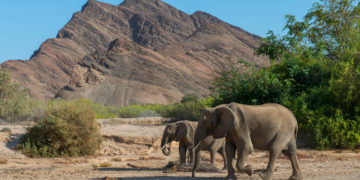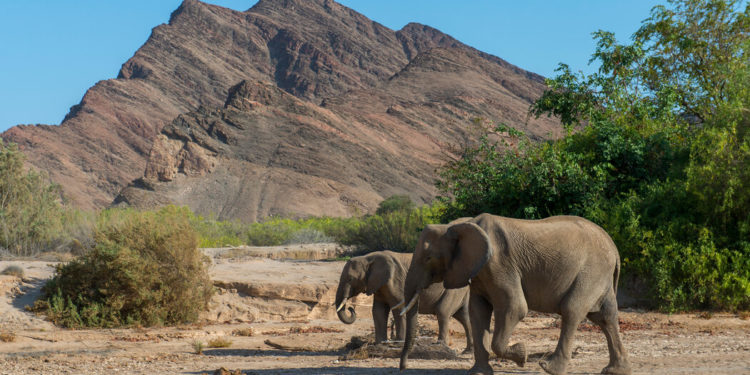Namibia, Facing Drought, Plans to Kill Elephants for Meat
- Update Time : Sunday, September 1, 2024

Namibia plans to cull elephants and sell their meat amidst a severe drought. The strategy aims to alleviate food scarcity and manage elephant populations.
Namibia, a country known for its diverse wildlife and stunning landscapes, is grappling with an environmental crisis. Drought conditions have persisted, affecting both human populations and wildlife. The government has proposed a controversial solution to address the issue: culling a number of elephants and selling the meat.
This measure seeks to provide relief for communities facing food shortages and to balance the ecosystem affected by the overpopulation of these large mammals. The decision has stirred debate among conservationists and the public, as it touches on the delicate balance between human needs and wildlife preservation. The move reflects the challenges countries like Namibia face in mitigating the impacts of climate change while ensuring sustainable living for its inhabitants and protecting its natural heritage.

Credit: dnyuz.com
Namibia’s Drought Crisis
Namibia is grappling with a severe drought. This environmental crisis has led to a tough decision: to cull elephants for meat. The drought’s severity has reached a critical point. Water sources are drying up, affecting both people and wildlife.
Local communities struggle to find drinking water and maintain crops. Animals, including the country’s famous elephants, face starvation and dehydration. The government’s plan aims to provide relief by utilizing the elephants as a food source. This has sparked much debate on conservation and sustainability.
The drought’s impact extends beyond immediate survival needs. It challenges the balance between preserving wildlife and ensuring community well-being. This situation reflects the broader issues of climate change and resource management in Namibia.
Elephants In Namibia
Namibia grapples with severe drought conditions. The nation contemplates a drastic measure to reduce its elephant population. They plan to harvest elephants for meat. This decision stems from the need to manage water and food resources.
The current elephant population is estimated at over 24,000. These numbers are high compared to past decades. Despite the increase, concerns over habitat sustainability persist. Elephants need large amounts of vegetation and water to survive.
Elephants play a crucial role in the ecosystem. They create pathways in dense forests. These pathways are vital for other animals. Elephants also help in seed dispersal. This contributes to forest regeneration. Their large dung piles are a rich source of nutrients for the soil.
Controversial Decision To Cull Elephants
The Namibian government recently announced a plan to cull elephants due to severe drought. This decision has sparked international debate. The country faces a critical situation with scarce water and food resources, leading to tough choices.
Elephants consume large amounts of vegetation and water. With prolonged dry conditions, their survival competes with that of humans and livestock. The culling aims to provide relief by reducing elephant numbers and utilizing the meat to support communities.
| Reason for Culling | Expected Outcome |
|---|---|
| Water scarcity | More resources for locals |
| Food shortages | Meat distribution to people |
| Environmental balance | Less strain on habitat |

Credit: www.nytimes.com
Public And International Reaction
The global community is deeply divided over Namibia’s decision. Conservation groups express alarm at the culling plan. They argue it could threaten elephant populations. On the other hand, some experts suggest that controlled culling may be necessary.
Within Namibia, local communities show mixed reactions. Some residents see the move as a way to combat hunger and reduce human-elephant conflicts. Others fear long-term damage to the country’s ecosystem and tourism.
Benefits Of The Culling Plan
The Namibian government has formulated a plan to address severe drought. By culling elephants, they aim to provide much-needed meat to communities struggling with food scarcity. This decision will not only feed many but also contribute to regulating elephant populations. Proper population control is crucial for maintaining ecosystem balance. It ensures other species and habitats remain healthy and sustainable.
Elephant numbers have grown in Namibia. This growth puts a strain on limited water and food resources. The culling plan seeks to mitigate these pressures. By doing so, the government hopes to establish a harmonious coexistence between wildlife and human communities. The initiative also presents a practical solution to the challenges posed by drought.
Concerns And Criticisms
Namibia’s strategy to mitigate drought effects by culling elephants for meat has sparked widespread debate. Critics argue the move raises ethical concerns, questioning its impact on conservation efforts.
| Ethical Questions | Long-Term Environmental Impact |
| The decision raises concerns about animal welfare and conservation ethics. | Killing elephants may disrupt ecosystems and endanger other species. |
| Many question the morality of using elephants for meat consumption. | Reducing elephant populations could upset the natural balance. |
Alternative Solutions
Namibia is exploring water conservation strategies to counteract drought effects. These strategies include rainwater harvesting and the use of water-saving technologies in agriculture. By implementing such measures, the country hopes to reduce water waste and preserve the precious resource for both humans and wildlife.
Moreover, the nation is considering elephant relocation to areas with better water sources. Proposals for creating sanctuaries offer safe havens where elephants can thrive without the threat of drought. These protected areas could provide a more sustainable solution for the long-term survival of the species.

Credit: dnyuz.com
Looking Ahead
Namibia is facing a severe drought. The government has plans to kill elephants for meat. This decision has sparked debate among conservationists. Some people believe this will save water and food. Others worry about the future of elephant populations. Elephants are crucial for the ecosystem. They help spread seeds and create water holes. Killing them could have long-term effects. Finding a balance is necessary for both conservation and survival.
Sustainable practices can help manage drought. Water conservation techniques are vital. Efficient irrigation systems save water. Planting drought-resistant crops is another solution. Farmers can use mulch to retain soil moisture. Rainwater harvesting is also beneficial. These practices can reduce the need to kill wildlife. Community education on sustainable practices is key. Everyone must work together to protect resources and wildlife.
Frequently Asked Questions
Why Is Namibia Culling Elephants?
Namibia is culling elephants to combat the severe drought affecting the country. The culling serves a dual purpose: alleviating the environmental pressure from elephant overpopulation and providing a source of meat for communities in need.
How Will Elephant Meat Be Used In Namibia?
The meat from culled elephants will be distributed to local communities. It aims to provide relief to those who are struggling with food scarcity due to the drought.
What Is The Impact Of Drought On Namibia’s Wildlife?
Drought in Namibia leads to scarce water and food resources, which can result in wildlife suffering and increased human-wildlife conflict. Elephants are particularly impacted, often encroaching on human settlements in search of sustenance.
How Is The International Community Reacting To Namibia’s Plan?
The international community’s reaction is mixed. Some environmentalists and animal rights advocates oppose the culling, while others support sustainable management and understand the complexities of Namibia’s situation.
Conclusion
The situation in Namibia raises concerns about the impact of drought on wildlife conservation efforts. Killing elephants for meat sparks ethical debates and environmental repercussions. It’s crucial to find sustainable solutions that balance human needs with wildlife protection for a harmonious coexistence.
Let’s advocate for responsible actions and conservation measures.


















Leave a Reply